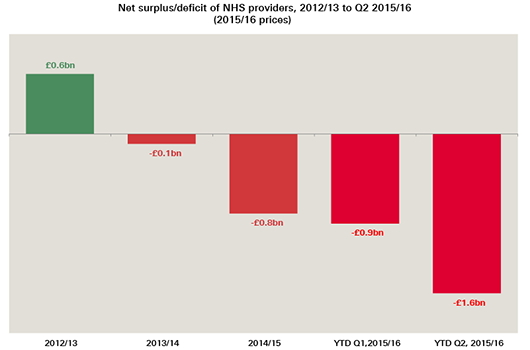 On the 25 November the Chancellor of the Exchequer will stand up in Parliament and make a statement that will shape much of the political landscape for the rest of this decade. More substantively these spending review decisions will impact every household in the UK. Given its importance it’s not surprising that, by all accounts, negotiations have been tough. Perhaps more surprising is that health is proving to be one of the most problematic areas of public spending to settle. Health was one of the clear commitments for the new government—the NHS would get the annual increases rising to £8bn over and above inflation in return for delivering £22bn savings based on Simon Steven’s Five Year Forward View.
On the 25 November the Chancellor of the Exchequer will stand up in Parliament and make a statement that will shape much of the political landscape for the rest of this decade. More substantively these spending review decisions will impact every household in the UK. Given its importance it’s not surprising that, by all accounts, negotiations have been tough. Perhaps more surprising is that health is proving to be one of the most problematic areas of public spending to settle. Health was one of the clear commitments for the new government—the NHS would get the annual increases rising to £8bn over and above inflation in return for delivering £22bn savings based on Simon Steven’s Five Year Forward View.
There are three big stumbling blocks for an agreement between the Treasury and the Department of Health. The first and almost certainly biggest point of contention is over what is called “front-loading” or “back-loading.” That is when exactly does the NHS see the extra cash in its budget? The health service needs the answer to be sooner rather than later. Monitor and NHS Trust Development Authority have just published their data on NHS providers’ financial position six months into the current year. This confirms the perilous state of NHS finances with over three quarters of providers now in deficit totalling £1.6bn, and an expected overspend of £2.2bn for the full year.
As Lord Carter of Coles concluded in his interim report on hospital productivity there are ‘‘significant efficiencies to be made but there is no magic wand for delivering them.” The NHS needs time to put in place new ways of working, and it needs investment in change and practical support to deliver them. The Health Foundation and the King’s Fund called for a dedicated Transformation Fund to support this. Add into the mix rising pension costs next year and without pump priming there simply won’t be enough money to keep services going. But for George Osborne, pump priming the NHS budget is at odds with his plan to cut the deficit quickly. The cuts to other departments are huge so raiding wider public services for extra NHS funding looks a non-starter.
The second issue blocking the path to agreement is that the NHS has always been clear that £8bn is just enough to keep services going—what it doesn’t do is fund lots of new commitments. But the government clearly wants to announce improvements in return for the additional investment—most obviously on seven day services.
The final challenge is perhaps the most profound—ensuring the settlement doesn’t rob Peter to pay Paul. Protecting the NHS while slashing social care, health education, and public health would be economic nonsense. It might deliver short term cash savings, but it risks eroding the efficiency and sustainability of our system in the longer term. Social care will be unable to shoulder further sharp cuts. Our recent analysis of the options for funding health and social care (Health Foundation Filling the Gap) estimated that social care faces a potential gap of £6bn by the end of the decade even before the impact of the new living wage was factored in. Sticking plaster solutions—like more pooled budgets—will not work.
For public health and health education, the vast majority of their budgets flow straight back to NHS providers. They cover services (health visiting, junior doctor costs) that have always been squarely part of the NHS envelope. The government must resist the temptation to re-define the NHS to a narrower range of services as a way of delivering its commitment on the £8bn at a cut price. Such a move would risk compromising the NHS’ ability to deliver quality care for patients.
Anita Charlesworth is the chief economist at the Health Foundation. Before joining the Health Foundation in May 2014, Anita was chief economist at the Nuffield Trust for four years where she led the Trust’s work on healthcare financing and market mechanisms. Anita was chief analyst and chief scientific advisor at the Department of Culture, Media, and Sport from 2007 to 2010 and, prior to this, she was director of public spending at the Treasury from 1998-2007, where she led the team working with Sir Derek Wanless on his reform of NHS funding in 2002.
Competing interests: Anita is vice-chair of the Whittington Hospital NHS Trust and a Trustee of Tommy’s, the baby charity.

